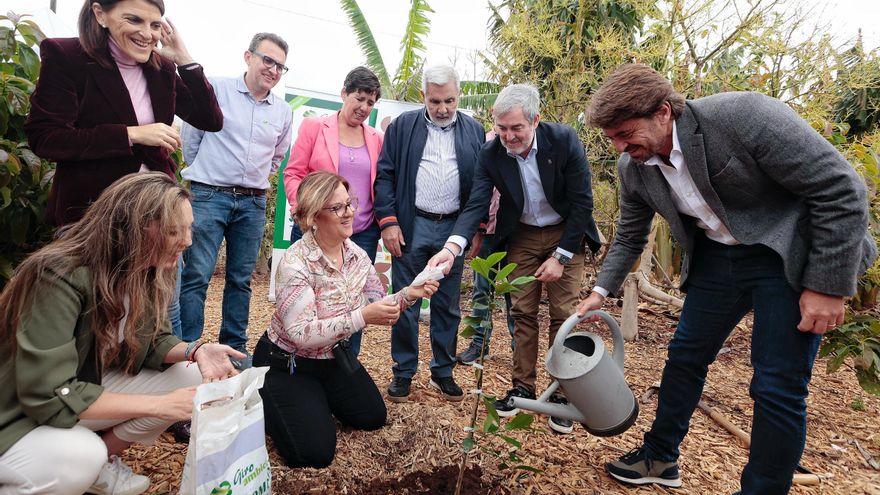
An organic farm in Guía de Isora, El Balo, is converting waste from 17 hotels in Tenerife into fertiliser for the Tenerife countryside. The project, called Circular Tourist Communities, which started two years ago with six hotels in Adeje led by the hotel association of the province of Tenerife (Ashotel) and the Association of Farmers and Ranchers of Canarias (Asaga), has already converted over 1,200 tonnes of biowaste into about 400 tonnes of organic compost.
Yesterday, Fernando Clavijo, President of the Government of Canarias, Ana Dorta and José Miguel Rodríguez Fraga, mayors of Guía de Isora and Adeje, and the Minister of the Environment of Tenerife Island Council, Blanca Pérez, learned about the results during a visit to the farm in Isora. The presidents of Ashotel and Asaga, Jorge Marichal and Ángela Delgado, showed the attendees how this circular tourist community operates, including top regional officials from the Tourism and Primary Sector, Jéssica de León and Narvay Quintero, as well as other public representatives.
This initial circular tourist community consists of 17 hotel establishments in Adeje, whose City Council was involved from the start, with a total of 11,344 beds. The aim of this initiative is to convert kitchen biowaste (fruit peels, vegetable scraps, coffee grounds) and pruning waste from tourist facilities into quality compost suitable for soil regeneration, mainly in municipal gardens, hotels, and agricultural estates, thereby avoiding burial at the Arico Environmental Complex.
Clavijo, Canarian President, cites this plan as an example of sustainability in the tourism sector
The initiative involves the participation of these 17 hotels associated with Ashotel: MYND Adeje, Tropical Park, Atlantic Holiday, Hard Rock Tenerife, RIU Buenavista, RIU Palace Tenerife, H10 Costa Adeje Palace, Guayarmina Princess, Coral Ocean View, Jardines de Nivaria, Royal Sunset Beach Club, Vincci La Plantación del Sur, Bahía Príncipe Sunlight Tenerife, Bahía del Duque, GF Gran Costa Adeje, Iberostar Bouganville Playa, and HOVIMA Costa Adeje.
The project is included in the successful case studies published in the guide to good circular economy practices driven by tourist destinations and companies, prepared by the State Trade Company for Innovation and Tourism Technologies (Segittur), a public entity under the State Secretary for Tourism.
Fernando Clavijo highlighted the cooperation between the tourism sector, as the “leader of the Archipelago”, and the primary sector, as the “guarantor of our territory”. “This synergy has resulted in an initiative of smart tourism that distributes wealth,” he pointed out. For the Canarian President, having all administrations present at this event, supporting projects like this, is “important,” emphasizing that “like all human activities, tourism has an impact on the territory and we must correct anomalies and distortions.” Finally, he highlighted the economic weight generated by tourism which, with only 4% of the territory, generates €22 billion in wealth and one million jobs.
Jorge Marichal, President of Ashotel, stated that “on a small scale, this is a decentralised model of organic matter management that works.” “If we had more farmers with authorised composting plants on the island, we could have more circular tourist communities established, forming groups of hotels with small Category A composting plants,” he stressed. Marichal proposed that the project “must be accompanied by a modification of the waste fees paid by hotels, so that those who reduce organic waste production should pay less.”
For Rodríguez Fraga, Mayor of Adeje, “this should be the beginning of a long journey in public-private collaboration, synergies between activities, agriculture and tourism, aimed at improving our waste management, reducing our carbon footprint, and promoting circular economy in the main economic sector of the Canary Islands.” Guía de Isora’s Mayor, Ana Dorta, who welcomed the municipality, expressed gratitude and stated that the municipality “has the intention and willingness to join this project, through selective waste collection, which is what we need to incorporate to be part of the project.”
Ángela Delgado, from Asaga, is convinced that this biowaste management and valorisation model, “currently without public funding,” is an example to follow for the rest of the islands in the Canary archipelago.















